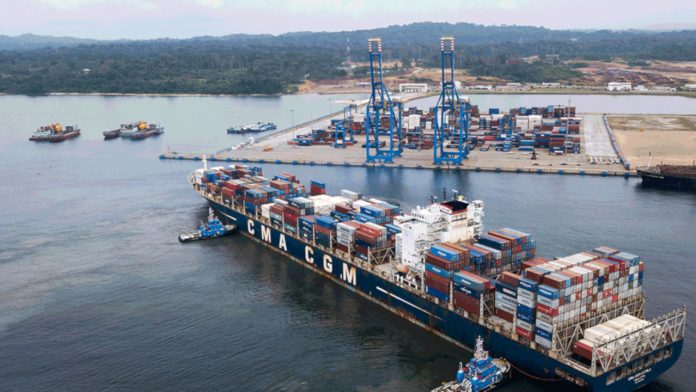The Asia-Africa routes are calling again at the Autonomous Port of Kribi (PAK), in Cameroon. After agreement between the various parties, at least one link per week will pass through the PAK, whose modernization work has resumed.
Announced on August 8, 2020, it was finally on August 17 that the CMA CGM Cendrillon called at the port of Kribi Conteneurs Terminal. At 334 meters long and with a capacity of 8,645 teu (twenty foot equivalent), this vessel inaugurates the direct Asia Africa line from the deep-water port of Kribi.
Indeed, Asia West Africa Service (ASAF) operated by the shipping company CMA CGM is one of the major services offered by shipowners as part of the transport of containers from Asia to Africa.
In partnership with Maersk and Nile Dutch, CMA CGM will, thanks to this service, provide outreach to the container terminal of the Autonomous Port of Kribi (PAK), thereby strengthening its vocation as a benchmark operator in the Gulf of Guinea region.
Thanks to this service, economic operators in Cameroon, Chad and the Central African Republic will benefit from favorable transit time for their goods to or from Asia. It is the result of beneficial consultation with all the players in the port area, including the PAK.
“The reopening of the ASAF line allows the port of Kribi to be better connected to the rest of the world”, comments Éric Lavenu, general manager of Kribi Conteneurs Terminal. With the provision of a customs office in 2020, which will complement the existing service offering, “we will be able to reduce transit time for a significant gain in productivity while considerably reducing costs”.
Pooling of resources!
The service had been suspended for lack of profitability. The PAK had observed a deficit between the costs of the ships’ stopovers and the revenues from the sea freight collected by the stopovers at Kribi. In addition, the volumes were not large enough to cover the ground handling costs.
Faced with pressure from partners, and after price adjustments, the Asia-Africa link finally resumed. The line has also benefited from the arrival of major players in maritime traffic, such as Maersk. “They allow resources to be pooled and thus help to make the Kribi service viable”, explains Habib Iya, marketing manager at PAK.
This recovery is good news for manufacturers in the region operating in Asia. Since 2018, Cameroon has directly supported trade with Asia, mainly China.
Maersk and CGA CGM, the third largest shipowner in the world, are therefore inaugurating a vessel sharing mechanism aimed at pooling costs, in order to serve the port platform every week.
Resumption of modernization work!
Made up of a group of Cameroonian shareholders, Bolloré, CMA CGM and CHEC, the Kribi Conteneurs Terminal consortium is the concessionaire of the container terminal of the deep-water port of Kribi. KCT offers the Cameroonian logistics chain an infrastructure adapted to the new generation of transoceanic vessels, including 350-meter docks that can accommodate vessels with a capacity of up to 11,000 teu.
This date is a new step in the relaunch of the port of Kribi, a port hub for Central Africa and the hinterland. Interrupted for a while due to the coronavirus pandemic, phase II of the PAK development work has resumed in the heart of summer, while its adjoining spaces have restarted.
Dredging and deforestation of the access road were already completed, as were the sites to accommodate the reservoir and the treatment plant. It remains to ensure the concreting of the reservoir and to carry out the tests of the treatment processes, specifies Patrice Melon, general manager of PAK. Likewise, work on the new channel has resumed.
The modernization foresees, in this second phase, the installation of a Vessel Trafic System (VTS) composed of a radar, an authentication receiver, a video surveillance system, as well as radio equipment. and data sensors.
These are all tools that will ensure site security and guarantee the efficiency of maritime traffic. This phase of the works is supervised by China Harbor Engineering Corp. (CHEC) for a total cost of around 400 billion CFA francs. The financing terms, comparable to those of the first phase, include a loan from Eximbank China, for 85% of the total.
Kribi sees far: the port still plans, by 2040, the deployment of a port infrastructure comprising twenty terminals, over 6.5 kilometers of quayside, capable of handling 100 million tonnes of goods per year.
In addition, the PAK and the Cameroonian Ministry of Agriculture have just signed a three-year framework agreement. It aims to pool efforts to implement procedures to facilitate the importation of agricultural tools and inputs, as well as the export of Cameroonian agricultural products.
PAK will participate in the creation of an “agricultural belt” surrounding the industrial and port complex of Kribi. It will make it possible to put an end to the food dependence of this zone, which should even become an exporter. The framework agreement, which is tacitly renewed every three years, provides for regular evaluations.

